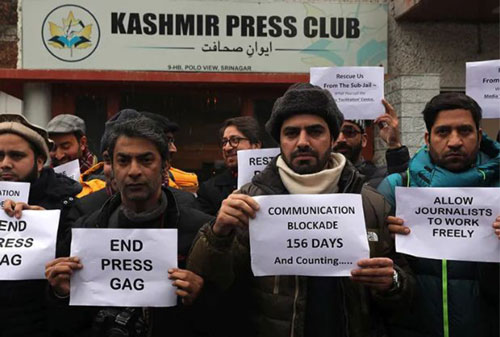A.G. Noorani
In its entire history, even at the best of times, press freedom in Kashmir has suffered constraints that were absent in the subcontinent. This was particularly true of the phase from 1947 to 1953 when Shaikh Mohammed Abdullah was prime minister of Jammu & Kashmir. Tolerance of dissent was not among his most conspicuous virtues.
Matters did not improve until after Shaikh Sahib’s restoration to power in 1975. He died in 1982. Despite the travails they faced, Kashmir’s journalists fought back by forging a united front in the form of a Kashmir Press Club. Behind Srinagar’s main artery, the Residency Road, are located the offices of very many press bodies. The distinguished editor of Rising Kashmir, Shujaat Bukhari, was shot dead one evening as he emerged from his office to go home. Two conflicting forces are after the press; each seeking unqualified support. One is the government and the other is the armed rebels.
Last September, the Press Council of India set up a fact-finding committee on Jammu & Kashmir whose report was published recently. It found that the press in Jammu & Kashmir especially in Kashmir was “slowly being chokedmainly because of the extensive curbs being imposed by the local administration”. It advised the government to shed its “tendency” to see all critical reportage and comment as “anti-national”.
The report of the fact-finding committee stated that the authorities believed that several media personnel were sympathising with the armed rebels, and that some journalists themselves accused others in their profession of being anti-national. One official said he preferred to engage with only certain journalists as opposed to holding news conferences, which he was open to previously.
A fact-finding report has highlighted the level of intimidation faced by Kashmir’s media.
The fact-finding committee made suggestions that would ensure that journalists would not be harassed, as press freedom has deteriorated in Kashmir, especially after August 2019 when New Delhi abrogated Kashmir’s autonomy. Civil law enforcement in Kashmir was also advised not to act on behalf of other departments. At the same time, it drew the line between insurgents and media personnel by noting: “If a journalist is bearing arms or carrying grenades and other ammunition, he is not a journalist, he is a militant, and should be treated as such.”
The committee’s reports asserted that the media’s task is to report the news, even if the authorities are not portrayed in a positive light, and noted the enhanced tensions under which the media works, pressured as it is from all sides.
Unfortunately, times are not good, and violence has affected the work of the media, especially the print media which relies on advertising which is on the wane. This has been true for other parts of the world as well.
The fact-finding report wants an end to the intimidation of journalists who face the threat of arrests. It mentions that several have been subjected to interrogation and threatened. “We have listed cases of journalists being summoned to the dreaded ‘Cargo Centre’ for questioning — a location reserved for interrogation for armed militants.” Since 2016, at least 49 journalists in Jammu and Kashmir have been arrested and charged under draconian laws, including the Unlawful Activities (Prevention) Act. The latter law is so ruthless that it even makes bail difficult.
In January, the local administration cancelled the allotment of the premises of Kashmir Press Club in Srinagar. The privileges of the journalists should be restored. It is sad that an environment where the truth is most needed to reflect what is happening in Kashmir, the body best equipped to highlight the truth should be muzzled through various means.
The fact-finding committee’s detailed report was, however, denounced, on its publication, by the Jammu & Kashmir Press Corps as being false and “malicious”. Threat to press freedom comes not only from the government and its instruments but also from a group of journalists that ardently supports the government and ferociously attacks whosever criticises it. Ravish Kumar, a brave TV anchor of NDTV India, speaks every evening at 9 pm. It is he who coined the very apt expression ‘godi media’ for those time-serving boot-lickers of the men in power.
Aakar Patel is the chair of Amnesty International, India. Recently, he was stopped from boarding a plane to the US by the Central Bureau of Investigation. His book Price of the Modi Years, published by Westland, contains a thorough encyclopedia survey of the servile anchors of Hindi TV — ‘godi media’, most of them. In Srinagar, not surprisingly, one organisation of journalists denounced the report. The more the state divides the press corps the worse will it be. The writer is an author and a lawyer based in Mumbai.
—Courtesy Dawn










